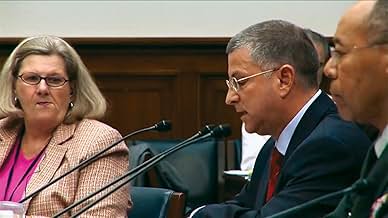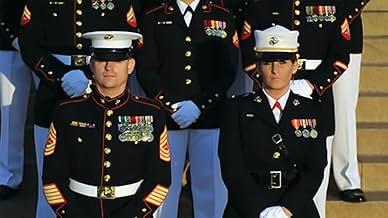CALIFICACIÓN DE IMDb
7.6/10
7.4 k
TU CALIFICACIÓN
Agrega una trama en tu idiomaAn investigative documentary about the epidemic of rape of soldiers within the US military.An investigative documentary about the epidemic of rape of soldiers within the US military.An investigative documentary about the epidemic of rape of soldiers within the US military.
- Dirección
- Guionistas
- Elenco
- Nominado a 1 premio Óscar
- 11 premios ganados y 14 nominaciones en total
Ariana Klay
- Self - US Marine Corps
- (as Lieutenant Ariana Klay)
Elle Helmer
- Self - US Marine Corps
- (as Lieutenant Elle Helmer)
Debra Dickerson
- Self - US Air Force
- (as Ret. Captain Debra Dickerson)
- Dirección
- Guionistas
- Todo el elenco y el equipo
- Producción, taquilla y más en IMDbPro
Opiniones destacadas
As one of the founders of the U.S. House of Representatives Military Sexual Assault Prevention Caucus, I have written legislation that is now the law to help combat and prevent sexual assault in our armed forces and to help victims seek justice. "The Invisible War" is a moving and uncomfortable documentary about an unspeakable crime, and a culture that unacceptably turns a blind eye. It has been instrumental in focusing a national spotlight on a shocking issue that affects one in three returning female veterans. I am grateful to the makers of the film who went to extreme lengths to interview not only dozens of survivors, but also those who are working to break the pattern. This is an important film dedicated to ensuring that the stories of the courageous men and women it features, and the countless others who share their reality, receive the attention they deserve so that we can bring an end to the heartbreaking violence and injustice depicted in this film.
Rape in the military is about as thorny and intractable a problem as deciding whether to go to mid-east war or not. The Invisible War solidly makes the argument that the military judicial process for rape is deeply flawed, if only because commanders are given the absolute right and power to determine how the accusations are handled.
Think about it: the commander could be the assailant or a friend and can dismiss a case with little recourse for the aggrieved soldier. This documentary hammers home both statistically and in practice how frustrating the process can be, sometimes leading to suicide. A recent court decision that rape is an "occupational hazard" doesn't help anything.
At the least, husbands and wives become tense or split; rarely is a marriage unaffected by the rape. For singles, the sympathy is not overwhelming, and without a support group, it is lonely out there to take on the chain of command. In a macho world where team attitude is high priority, rape allegations are not welcomed, especially if the rapist is the commanding officer.
As I find in many documentaries, only one side is examined (Michael Moore being the leading exponent of the lopsided argument). In the case of The Invisible War, we are well served with victims who get no satisfaction, but we don't experience fully the case where the accused is found to have been wronged by the accuser. However, the doc does an effective job with the stories of women who accused but rarely gained a conviction.
The percentage of adjudicated cases where the accused is found guilty is small. Given the thousands of allegations, that number seems too small. At any rate, after seeing this documentary, Secretary of Defense made a bold decision that confirms the efficacy of a well-made documentary.
Think about it: the commander could be the assailant or a friend and can dismiss a case with little recourse for the aggrieved soldier. This documentary hammers home both statistically and in practice how frustrating the process can be, sometimes leading to suicide. A recent court decision that rape is an "occupational hazard" doesn't help anything.
At the least, husbands and wives become tense or split; rarely is a marriage unaffected by the rape. For singles, the sympathy is not overwhelming, and without a support group, it is lonely out there to take on the chain of command. In a macho world where team attitude is high priority, rape allegations are not welcomed, especially if the rapist is the commanding officer.
As I find in many documentaries, only one side is examined (Michael Moore being the leading exponent of the lopsided argument). In the case of The Invisible War, we are well served with victims who get no satisfaction, but we don't experience fully the case where the accused is found to have been wronged by the accuser. However, the doc does an effective job with the stories of women who accused but rarely gained a conviction.
The percentage of adjudicated cases where the accused is found guilty is small. Given the thousands of allegations, that number seems too small. At any rate, after seeing this documentary, Secretary of Defense made a bold decision that confirms the efficacy of a well-made documentary.
"The Invisible War" is Oscar-nominated documentarian Kirby Dick's latest exploration of something terribly wrong with a venerable institution. Previous targets of Dick's camera have been the Catholic Church and its handling of child abuse cases ("Twist of Faith,") closeted politicians undermining advances in gay rights ("Outrage,") and Hollywood's incomprehensible ratings system ("This Film is Not Yet Rated.") This time he takes on the U.S. Military and its abominable record in the handling of sexual assaults on and by active duty service people.
The film consists of interviews of victims of sexual assault with cases going back to the 1960's up to the present day. The victims (both male and female) relate the horror inflicted upon them – not just by their perpetrators, but by a military justice system that fails them. Many of the victims state that the pain the went through with the assault was nothing compared to the hell that they went through in their attempts to seek justice, proper medical and psychological care for their trauma, and to return to some sort of normalcy in their lives.
Filled with damning statistics (20% of all female military personnel have dealt with sexual assault – does that not bother you?) and interviews with bureaucrats (both military and political,) it's the personal stories of those who tried to serve their country that get to you. These men and women entered to honorably serve and were driven out by a system that believes it's more important to protect one's own (usually meaning an officer) rather than support their troops.
The film is a call to action to make one simple change to the current military system. The decision whether to prosecute a case is made by the site commander. Often, this commander knows or has a relationship with the accused. Does this not seem like a conflict of interest? The film highlights a group that is seeking to change that and encourages the viewer to express their outrage to those who might be able to change things. They want you to do more than slap an "I Support Our Troops" bumper sticker on your car. Will you really support your troops? Really? The facts, figures, and stories in "The Invisible War" should turn the stomach of every citizen of our nation, regardless of political affiliation. This is not a political issue. This is a criminal justice issue. This is a human rights issue.
This is activist filmmaking at its best.
www.worstshowontheweb.com
The film consists of interviews of victims of sexual assault with cases going back to the 1960's up to the present day. The victims (both male and female) relate the horror inflicted upon them – not just by their perpetrators, but by a military justice system that fails them. Many of the victims state that the pain the went through with the assault was nothing compared to the hell that they went through in their attempts to seek justice, proper medical and psychological care for their trauma, and to return to some sort of normalcy in their lives.
Filled with damning statistics (20% of all female military personnel have dealt with sexual assault – does that not bother you?) and interviews with bureaucrats (both military and political,) it's the personal stories of those who tried to serve their country that get to you. These men and women entered to honorably serve and were driven out by a system that believes it's more important to protect one's own (usually meaning an officer) rather than support their troops.
The film is a call to action to make one simple change to the current military system. The decision whether to prosecute a case is made by the site commander. Often, this commander knows or has a relationship with the accused. Does this not seem like a conflict of interest? The film highlights a group that is seeking to change that and encourages the viewer to express their outrage to those who might be able to change things. They want you to do more than slap an "I Support Our Troops" bumper sticker on your car. Will you really support your troops? Really? The facts, figures, and stories in "The Invisible War" should turn the stomach of every citizen of our nation, regardless of political affiliation. This is not a political issue. This is a criminal justice issue. This is a human rights issue.
This is activist filmmaking at its best.
www.worstshowontheweb.com
There are a number of things Invisible War does well.
1. It conveys a point of view.
2. It's about a compelling subject.
3. It has sympathetic characters.
4. It has a narrative arc, which is challenging. It relies on the lawsuit and Cioca's disability claim.
5. The cinematography, audio and film making don't draw attention to themselves and distract from the subject.
I was quoted in a book about sexual assault in the military. In that book the author made the assumption there was some golden age before sexual assault was a problem in the military, a claim she offered no proof of.
I mention this because it's possible to tell the story of rape and sexual assault in the military and get it wrong.
This film uses a pretty hard-and-straight approach. It sticks to cases that are pretty well documented to illustrate the statistical picture create by the military's own data.
And the film has a couple villains to root against. The Air Force major general and her civilian predecessor come off as part clueless and part immoral.
1. It conveys a point of view.
2. It's about a compelling subject.
3. It has sympathetic characters.
4. It has a narrative arc, which is challenging. It relies on the lawsuit and Cioca's disability claim.
5. The cinematography, audio and film making don't draw attention to themselves and distract from the subject.
I was quoted in a book about sexual assault in the military. In that book the author made the assumption there was some golden age before sexual assault was a problem in the military, a claim she offered no proof of.
I mention this because it's possible to tell the story of rape and sexual assault in the military and get it wrong.
This film uses a pretty hard-and-straight approach. It sticks to cases that are pretty well documented to illustrate the statistical picture create by the military's own data.
And the film has a couple villains to root against. The Air Force major general and her civilian predecessor come off as part clueless and part immoral.
The Invisible War not only us educates about the tragedy of rape in the military, about the cover-up of the crimes, but it educates us about the problem or rape in our society. The military commanders ignore and hide rapes and the statistics presented in the film of these crimes are important to note. I can't imagine anyone who actually saw this movie giving it less than an 8 ranking.
The interview of the victims is heartbreaking, and the interviews of those involved in the cover-up are aggravating. These women, and men, who face sexual assault in the military need our full support and the military culture must change. The movie is a powerful indictment of the military and a tribute to the strength of the survivors and their families and allies.
Peace, Tex Shelters
The interview of the victims is heartbreaking, and the interviews of those involved in the cover-up are aggravating. These women, and men, who face sexual assault in the military need our full support and the military culture must change. The movie is a powerful indictment of the military and a tribute to the strength of the survivors and their families and allies.
Peace, Tex Shelters
¿Sabías que…?
- TriviaA rare example of a film actually influencing government/military policy, end credits state that "On April 14.2012, Secretary of Defense Leon Panetta, watched this film. Two days later, he took the decision to prosecute away from unit commanders." However, it was noted that "this is not enough." The preceding is a true statement, but can be misleading. Military Commanders still hold prosecutorial discretion, but they can no longer be in the unit where the alleged misconduct had taken place. An "outside, higher ranking colonel" would now hold prosecutorial discretion.
- Citas
Kori Cioca - US Coast Guard: Thank you for your sacrifice, in whatever shape it may come with serving. God Bless.
- ConexionesEdited into Independent Lens: The Invisible War (2013)
- Bandas sonorasNeed Someone
Performed by Mary J. Blige
Courtesy of Geffen Records under license from Universal Music Enterprises
Selecciones populares
Inicia sesión para calificar y agrega a la lista de videos para obtener recomendaciones personalizadas
- How long is The Invisible War?Con tecnología de Alexa
Detalles
Taquilla
- Total en EE. UU. y Canadá
- USD 71,968
- Fin de semana de estreno en EE. UU. y Canadá
- USD 16,500
- 24 jun 2012
- Total a nivel mundial
- USD 71,968
- Tiempo de ejecución
- 1h 33min(93 min)
- Color
- Relación de aspecto
- 1.78 : 1
Contribuir a esta página
Sugiere una edición o agrega el contenido que falta



























